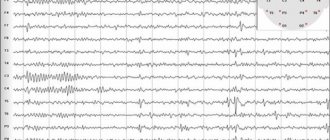Today, 65-70% of people with epilepsy are in stable remission thanks to progress in the field of epileptology and pharmacology. Against this background, their quality of life improves significantly. Their social adaptation is also improving: they are increasingly getting married and having children. However, pregnancy in women suffering from epilepsy has its own characteristics and is accompanied by the solution of a large number of problems, which requires the joint efforts of neurologists and obstetricians-gynecologists. AiF.ru asked Irina Zhidkova, professor, neurologist, doctor of medical sciences, epileptologist at the Institute of Child and Adult Neurology and Epilepsy, to tell us about the peculiarities of pregnancy in women with epilepsy.
Careful preparation and control
Anna Shatokhina, AiF.ru: Irina Aleksandrovna, what are the features of the course of pregnancy with epilepsy? What nuances should the expectant mother take into account?
Related article In figures and facts: about 65 million people in the world suffer from epilepsy
Irina Zhidkova : Pregnant women suffering from epilepsy represent a high risk group, since epileptic seizures that occur during pregnancy can negatively affect both the health of the mother and the health of the unborn child.
In turn, antiepileptic drugs (AEDs) can have an adverse effect on the fetus, that is, cause fetal malformations. To avoid the negative impact of seizures and AEDs, an expectant mother suffering from epilepsy should know that pregnancy must be planned together with a neurologist-epileptologist (and this is mandatory!), be observed by him during pregnancy, undergo the necessary examinations and strictly follow the recommendations of the attending physician. In no case should she independently stop taking an antiepileptic drug after learning about pregnancy (the consequences can be catastrophic).
— How can maternal epilepsy affect the condition of the fetus? What are the consequences of seizures in a pregnant woman?
— For the majority of women with epilepsy who are planning pregnancy and following the recommendations of a neurologist-epileptologist, everything proceeds favorably. Pregnancy should be planned together with the attending physician against the background of stable drug remission (when there are no attacks during treatment for at least 1 year, and optimally for at least 2 years). Observation by a neurologist-epileptologist is required once a trimester (in the absence of seizures), and folic acid intake is required to prevent fetal malformations. Naturally, you should undergo prenatal screening in a timely manner, monitor the electroencephalogram (EEG) and the concentration of AEDs in the blood. When pregnancy is not planned in advance and occurs against the background of active epilepsy, an increase in epileptic seizures during pregnancy is possible. And this negatively affects the condition of both the mother and the unborn child: threat of miscarriage, injury, delayed fetal development, congenital malformations, etc.
The disease with a thousand names. 10 myths about epilepsy Read more
— What medications can keep the disease under control? After all, not all medications are allowed during pregnancy.
— The specialist is faced with a difficult task: to prevent the development of convulsive attacks during pregnancy against the background of minimally effective doses of an antiepileptic drug that has the least teratogenic effect. The decision on the choice of drug and its dosage should be made by a neurologist-epileptologist, taking into account the balance of benefit and risk. Pregnancy should be planned on the minimum effective doses of the drug that has been used to achieve remission of the disease. However, it is unacceptable to change the drug or form of the drug during pregnancy. It is important to remember that there is no ideal AED that would be absolutely safe during pregnancy. All known anticonvulsants, to a greater or lesser extent, have a potential teratogenic effect, that is, they can cause fetal malformations: congenital malformations and microanomalies.
Article on the topic
The ambulance is listening.
How to provide first aid for a seizure - Is epilepsy a hereditary disease?
Is it true that a child whose both parents suffer from this pathology may have a 10-12% increased risk of developing the problem? — The causes of epilepsy are different: they determine the form of the disease. There are hereditary forms of the disease (genetic) and symptomatic, arising against the background of other brain diseases: for example, associated with birth trauma, severe traumatic brain injury, against the background of vascular and degenerative diseases of the brain, brain tumors, etc. If the mother child suffers from a genetic form of the disease, the risk of epilepsy in an unborn child throughout life is on average 10%. If it is different (symptomatic), then the risk of predisposition to this disease is not higher than 2-3%. As practice shows, it is extremely rare to meet married couples where both parents suffer from epilepsy. At the stage of pregnancy planning, a married couple needs to undergo a consultation with a geneticist.
Most women with epilepsy have normal, uncomplicated pregnancies. However, the risk of congenital malformations of the fetus while taking AEDs is 2-3 times higher than in the general population. Congenital malformations are divided into major malformations and minor anomalies. Malformations include: malformations of the central nervous system, spina bifida, facial clefts (“cleft palate”, “cleft lip”), heart defects, defects of the genitourinary system, etc. In practice, microanomalies are more common: deviations from normal morphology that do not pose a threat for health and do not require any intervention.
To prevent these disorders even at the stage of pregnancy planning, women taking AEDs are prescribed folic acid (5 mg per day) prophylactically until the end of the first trimester of pregnancy. The woman is observed jointly by a neurologist-epileptologist and an obstetrician-gynecologist, and prenatal screening is carried out in a timely manner (biochemical blood tests, fetal ultrasound, testing of alpha-fetoprotein in the blood, etc.). Modern diagnostic methods make it possible to identify severe congenital anomalies in the early stages of pregnancy and promptly decide on its termination.
Prevention
Preventive measures include:
- Normalization of the daily routine. This is especially true for rest, since a pregnant woman should get enough sleep.
- In the diet, it is recommended to reduce portions of meat to the minimum, and increase greens and vegetables. At the same time, to normalize the level of incoming protein, consider plant analogs, and medicinal ones for iron.
- Complete all prescribed procedures and examinations on time, and also regularly visit doctors: gynecologist, neurologist, geneticist, epileptologist.
Currently, doctors are confident that epilepsy and pregnancy are compatible, and although a woman with such a diagnosis needs more careful diagnosis and observation, the probability of a successful delivery and the appearance of a normal healthy child is approximately 95%.
How does childbirth go?
Epilepsy is not an absolute contraindication to natural delivery. However, it must be taken into account that childbirth can provoke seizures. Delivery should take place under the careful supervision of a gynecologist, neurologist, and anesthesiologist who already have experience working with pregnant women suffering from epilepsy.
Management of labor and pain relief is similar to normal childbirth. The most optimal method of pain relief is epidural anesthesia. Contraindications to its implementation arise in exceptional cases. The risk of seizures, if all rules of labor management are followed, does not exceed 1-2%.
An important condition for the successful course of labor is continuation of treatment with prescribed medications. Be sure to regularly use anticonvulsants. The psychological support of the woman in labor, which can be provided to her by her husband or other close relative, is important.
Immediately after birth, the baby is recommended to be given vitamin K at a dosage of 1 mg/kg.
During the postpartum period, a woman needs additional monitoring. If you feel generally unwell, drowsiness, or tremors of the limbs, a review of the dosage of anticonvulsants is necessary.
Epilepsy and breastfeeding
After childbirth, treatment with medications to help avoid epileptic seizures is continued. In this regard, young mothers worry whether such drugs will harm the baby’s health. Such fears are often the basis for a mother's refusal to breastfeed.
Pediatricians and breastfeeding specialists note that treatment with antiepileptic drugs is not an obstacle to breastfeeding. The level of concentration of substances from drugs received during pregnancy is much higher than that which comes with mother's milk.
The first breastfeeding can occur immediately after childbirth, while the woman in labor is in the delivery room. The duration of breastfeeding should be at least the first six months.
If a woman is afraid of recurrence of seizures, it is better to carry out the feeding process in a lying position.
Planning pregnancy with epilepsy
With this disease, pregnancy must be planned in advance. A favorable time for conception is considered to be the period of remission, during which there have been no seizures for two or more years. If a woman was taking anticonvulsants during this period, the doctor may stop them while planning pregnancy.
To prepare for conception, the expectant mother must follow a number of rules that will help her avoid an unpredictable exacerbation of the disease. If a woman has epilepsy, it is recommended to:
- do not overwork physically;
- avoid stress;
- maintain a sleep schedule (sleep at least 8 hours a day);
- eat according to a schedule, eat healthy foods;
- walk more often;
- do not drink alcohol;
- cure chronic diseases.
Indications and contraindications for conceiving a child with epilepsy
The disease progresses differently, so for some women with epilepsy pregnancy is absolutely contraindicated, while for others it is allowed. In treatment, doctors’ efforts are aimed at achieving stable remission.
If the attacks recur only from time to time and are not complicated by secondary generalization, doctors usually have nothing against pregnancy. According to research results, an increase in epilepsy attacks during pregnancy occurs in only 5% of women.
Contraindications to conception with epilepsy are:
- personality disorders;
- status epilepticus (seizures follow one after another);
- frequent convulsive attacks, complicated by generalization and difficult to respond to drug therapy.
In epilepsy, we are talking about relative indications for pregnancy. Women with this disease can become pregnant in the following cases:
- subcompensation of the disease with rare attacks;
- stable drug remission.
Postpartum period
In the first 2 days after childbirth, a woman’s risk of epilepsy increases. Seizures can be prevented by reducing the level of stress and nervous stimuli, taking medications correctly and getting enough sleep.
The use of medications for epilepsy immediately after childbirth is adjusted by a neurologist. In the first days, the patient is transferred to a standard dosage with a minimum. The need to increase the dose of drugs is explained by the fact that during childbirth a woman loses a lot of blood, the absorption of various substances deteriorates, and body weight sharply decreases.
Important! You can breastfeed your baby even after increasing the dosage. During pregnancy, he was already receiving much higher doses of AEDs than he receives in breast milk.
If a woman experiences seizures after giving birth, she remains under the supervision of medical staff. To avoid injury to the newborn, the child can be taken for a short period of time. Preferably lying on the bed, not standing.
Pregnancy and epilepsy are conditions that are compatible and do not pose a serious threat to a woman’s health if the pathology is not severe. The prognosis is especially favorable for those patients whose epilepsy has entered the stage of stable remission and has not had seizures for more than 2 years. But even in the presence of non-generalized seizures, the chance of a successful pregnancy and the birth of a healthy child is high.











